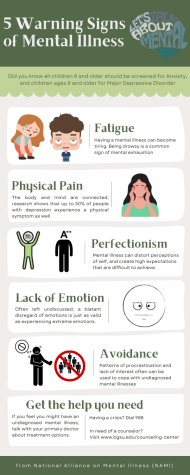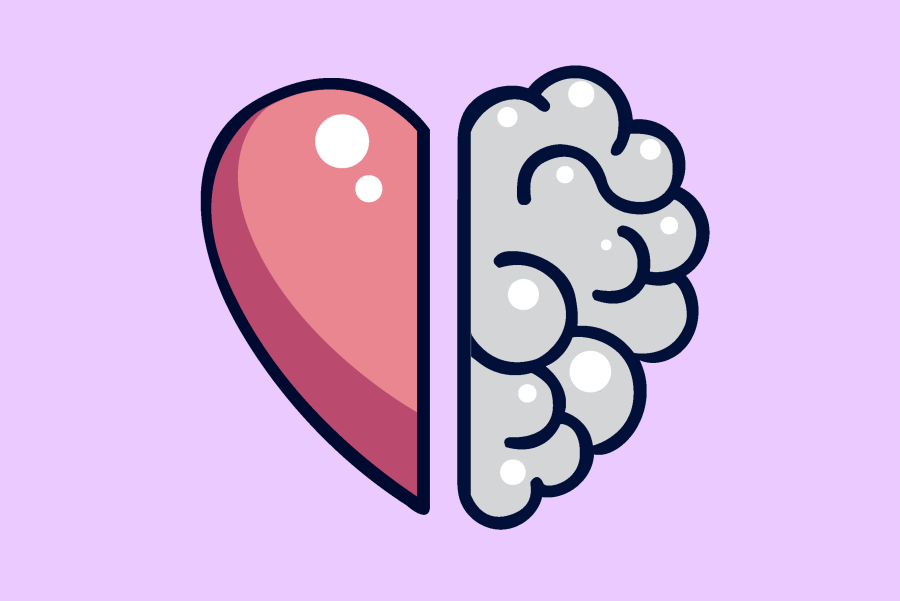Isolation trauma takes toll on colleges
January 17, 2023
Bowling Green State University students, a group that was already facing higher levels of stress and mental health challenges, say they are reeling in the aftermath of the pandemic nearly three years after COVID-19 appeared in the United States.
Students and staff at BGSU have continued to notice that students, many of whom were already struggling before the COVID-19 pandemic struck, continue to struggle with building peer relationships, seeking support resources and challenges they said have been exacerbated by the trauma of social isolation during the pandemic.
Research from the American Psychology Association shows that the mental health challenges experienced by BGSU students are common among Generation Z adults, as nine out of 10 experience a physical or emotional symptom due to stress, and only half of Gen Z feel they do enough to manage their stress.

Gen Z students like Tesla Bias, a third-year BGSU student, said they’ve witnessed this struggle in their own lives.
“I have experienced fatigue from stress, which has prevented me from going to class before,” said Bias. “Highlighting the struggles of students will help our institution and professors better understand us at more of a personal level and understand what is causing challenges in courses.”
BGSU students said their mental health struggles contribute to feelings of being isolated and fear of participating in a post-pandemic classroom.
“In the very large lectures, I’ve noticed how nobody has felt comfortable participating in front of almost 200 people,” said Bias. “I don’t often see people making friends with classmates, but rather only talking if they came in with people they already knew.”
Staff and faculty at the university said they are aware of the collective trauma inflicted by social isolation during the pandemic and have increased support resources for the students.
“As people trickled back after COVID-19… they were having to learn to be on their own, manage finances and, in some cases, having to work while balancing class,” said Phil Hughes, a licensed counselor and the outreach coordinator at BGSU’s Counseling Center. “You take away all the other pieces, and college is just stressful and hard. I would hope universities would put money or resources toward mental health support.”
Gen Z students may need more support than other demographics, even without the stress of the pandemic, experts said.
BGSU participates in the Thrive Initiative which includes hosting activities that promote physical and mindful health for BGSU students, faculty and staff.
Many of the groups on campus are working on mental health and well-being initiatives, including the BGSU National Alliance on Mental Illness, which focused on normalizing discussions of mental health.
NAMI BGSU, a student-run organization, hosted multiple events throughout the Fall semester related to spreading mental health awareness and abolishing the offensive portrayals of mental health in pop culture.
“Several events we have such as the Self-Care Street Fair, have provided resources to those who may need them,” said Quinn Lamp, vice president of NAMI BGSU. “Students aren’t always aware of the resources that are completely available to them through the university, and raising awareness about this will help students.”
NAMI BGSU has also provided students with other resources aimed at guiding them and/or their peers in the direction to receive proper help while navigating through their college journey.
Groups are also working on the national level to better the lives of millions of Americans affected by mental health.
A report published by the U.S. Preventative Service Task Force (USPSTF) in October of 2022, aimed to address the struggles young people face while coping with mental health conditions in social interactions and professional and educational environments.
The report said earlier diagnosis and treatment of mental health disorders result in lower rates of recurring mental illness and better response to treatment, according to USPSTF.
The USPSTF report also argued that placing a greater emphasis on the importance of mental health during youth could majorly benefit people affected by mental illness.
This is something Hughes has seen at BGSU’s Counseling Center firsthand.
“I think as awful as the pandemic was, there’s also this silver lining of destigmatization at the time from the generation coming up,” said Hughes. “They are good about destigmatizing and talking about mental health. It’s not this taboo thing like in previous generations.”
Organizations like the USPSTF said they hope to continue combating stigma via early diagnosis and treatment of mental health issues for young people.
The USPSTF report recommended adolescents be screened regularly for both anxiety and major depressive disorder (MDD) by their primary care provider, as it is estimated that nearly one in three children ages 12 to 17 have a diagnosed anxiety disorder and 3.2 million adolescents have had at least one major depressive episode, according to the Cleveland Clinic.
Medical professionals have also concluded that the prevalence of mental health struggles among young people has been on the rise over the past decade. Experts believe providing screening and treatment at an earlier age will improve the chances of long-term success for patients diagnosed with mental health conditions.
Gen Z students who are part of certain identity groups are at a higher risk of occurring mental health challenges.
Systemic racism has profound effects on Gen Z’s mental health, and the American Academy of Pediatrics declared racism as one of the leading causes of mental health concerns that black youth experience. Black teens and children have higher rates of suicide than previous generations, according to the CDC.
BGSU’s Counseling Center has attempted to address these issues through both one-on-one counseling and group therapy sessions aimed to target specific audiences, including the LGBTQ+ community and people who have chronic illnesses. Students who are leaving campus for an extended period can also continue services virtually with their designated counselor.
Black students at BGSU were experiencing two emotionally exhausting situations side-by-side in 2020, as people were experiencing social isolation due to the COVID-19 pandemic and protesting racial inequality nationwide.
“We need to continue to provide access to a diverse staff that can run BIPOC support groups,” said Hughes. “In an ideal world, there would be mandated mental health training for all faculty and staff.”












